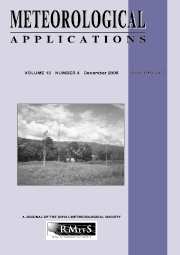Crossref Citations
This article has been cited by the following publications. This list is generated based on data provided by
Crossref.
Sandeep, S.
Chandrasekar, A.
and
Singh, D.
2006.
The impact of assimilation of AMSU data for the prediction of a tropical cyclone over India using a mesoscale model.
International Journal of Remote Sensing,
Vol. 27,
Issue. 20,
p.
4621.
Vaidya, S. S.
2006.
The performance of two convective parameterization schemes in a mesoscale model over the Indian region.
Meteorology and Atmospheric Physics,
Vol. 92,
Issue. 3-4,
p.
175.
Dash, S. K.
Shekhar, M. S.
and
Singh, G. P.
2006.
Simulation of Indian summer monsoon circulation and rainfall using RegCM3.
Theoretical and Applied Climatology,
Vol. 86,
Issue. 1-4,
p.
161.
Sandeep, S.
Chandrasekar, A.
and
Dash, S. K.
2007.
Impact of modification of initial cyclonic structure on the prediction of a cyclone over the Arabian Sea.
Natural Hazards,
Vol. 41,
Issue. 3,
p.
487.
Sandeep, S.
Chandrasekar, A.
and
Dash, S. K.
2007.
Atmospheric and Oceanic.
p.
1443.
Vaidya, S. S.
2007.
Simulation of weather systems over Indian region using mesoscale models.
Meteorology and Atmospheric Physics,
Vol. 95,
Issue. 1-2,
p.
15.
Sanjay, J.
2008.
Assessment of Atmospheric Boundary-Layer Processes Represented in the Numerical Model MM5 for a Clear Sky Day Using LASPEX Observations.
Boundary-Layer Meteorology,
Vol. 129,
Issue. 1,
p.
159.
Sikka, D. R.
and
Sanjeeva Rao, P.
2008.
The use and performance of mesoscale models over the Indian region for two high-impact events.
Natural Hazards,
Vol. 44,
Issue. 3,
p.
353.
Bhaskar Rao, D. V.
Hari Prasad, D.
and
Srinivas, D.
2009.
Impact of horizontal resolution and the advantages of the nested domains approach in the prediction of tropical cyclone intensification and movement.
Journal of Geophysical Research: Atmospheres,
Vol. 114,
Issue. D11,
Srinivas, C. V.
Yesubabu, V.
Venkatesan, R.
and
Ramarkrishna, S. S. V. S.
2010.
Impact of assimilation of conventional and satellite meteorological observations on the numerical simulation of a Bay of Bengal Tropical Cyclone of November 2008 near Tamilnadu using WRF model.
Meteorology and Atmospheric Physics,
Vol. 110,
Issue. 1-2,
p.
19.
Mandal, M.
and
Mohanty, U. C.
2010.
Simulation of Severe Land-Falling Bay of Bengal Cyclones During 1995–1999 Using Mesoscale Model MM5.
Marine Geodesy,
Vol. 33,
Issue. 4,
p.
315.
Mukhopadhyay, P.
Taraphdar, S.
and
Goswami, B. N.
2011.
Influence of moist processes on track and intensity forecast of cyclones over the north Indian Ocean.
Journal of Geophysical Research,
Vol. 116,
Issue. D5,
Mukherjee, Sandipan
Shukla, Ravi P.
and
Pandey, Avinash C.
2011.
Challenges and Opportunities in Agrometeorology.
p.
149.
Deshpande, M. S.
Pattnaik, S.
and
Salvekar, P. S.
2012.
Impact of cloud parameterization on the numerical simulation of a super cyclone.
Annales Geophysicae,
Vol. 30,
Issue. 5,
p.
775.
Kanase, Radhika D.
and
Salvekar, P. S.
2015.
Effect of physical parameterization schemes on track and intensity of cyclone LAILA using WRF model.
Asia-Pacific Journal of Atmospheric Sciences,
Vol. 51,
Issue. 3,
p.
205.
Singh, K.S.
and
Bhaskaran, Prasad K.
2017.
Impact of PBL and convection parameterization schemes for prediction of severe land-falling Bay of Bengal cyclones using WRF-ARW model.
Journal of Atmospheric and Solar-Terrestrial Physics,
Vol. 165-166,
Issue. ,
p.
10.
Reddy, M. Venkatarami
Prasad, S. B. Surendra
Krishna, U. V. Murali
and
Reddy, K. Krishna
2017.
Tropical Cyclone Activity over the North Indian Ocean.
p.
337.
Yesubabu, Viswanadhapalli
Kattamanchi, Vijaya Kumari
Vissa, Naresh Krishna
Dasari, Hari Prasad
and
Sarangam, Vijaya Bhaskara Rao
2020.
Impact of ocean mixed‐layer depth initialization on the simulation of tropical cyclones over the Bay of Bengal using the WRF‐ARW model.
Meteorological Applications,
Vol. 27,
Issue. 1,
Maurya, R. K. S.
Mohanty, M. R.
Sinha, P.
and
Mohanty, U. C.
2020.
Performance of hydrostatic and non‐hydrostatic dynamical cores in RegCM4.6 for Indian summer monsoon simulation.
Meteorological Applications,
Vol. 27,
Issue. 3,

